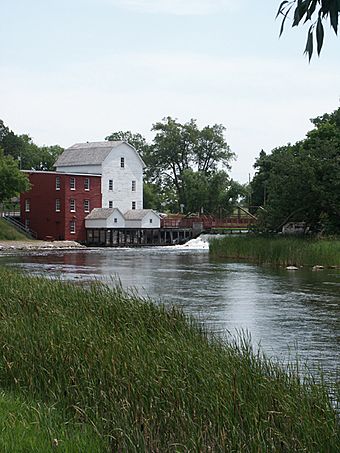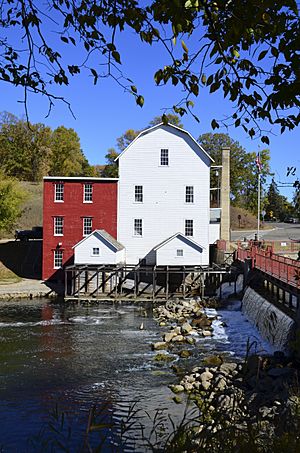Phelps Mill facts for kids
Quick facts for kids |
|
|
Phelps Mill
|
|
|
U.S. Historic district
Contributing property |
|

The Otter Tail River as it passes Phelps Mill
|
|
| Nearest city | Underwood, Minnesota |
|---|---|
| Built | 1889 |
| Part of | Phelps Mill Historic District (ID84001640) |
| NRHP reference No. | 75002145 |
| Added to NRHP | February 24, 1975 |
Phelps Mill is an old flour mill located in Otter Tail County, Minnesota, United States. It sits right on the Otter Tail River. This mill was built a long time ago, between 1888 and 1889.
Contents
What Was Phelps Mill?
Building a Busy Mill
A local businessman named William E. Thomas built Phelps Mill. He already owned a flour and feed business in Fergus Falls, Minnesota. Back then, wheat was a very important crop. There were almost a thousand flour mills working across Minnesota!
William Thomas started building a wooden dam on the river in the spring of 1888. A dam helps control the water flow to power the mill. This dam sometimes leaked, so workers had to use sandbags, dirt, and gravel to fix it.
The mill building itself was put together by a skilled builder named Royal Powers. He was amazing because he built the whole mill without using any blueprints. Blueprints are like detailed plans or drawings. Royal Powers kept the entire plan in his head and didn't even need to mark the wood before cutting it!
How the Mill Worked
The mill officially opened in October 1889. It was designed to make about 60 to 75 barrels of flour every day. That's a lot of flour! For its first few years, the mill was very successful.
In 1895, William Thomas added more space to the mill. This new part was used to grind other grains like buckwheat and rye. He also built a small house for people who stayed overnight, called a bunkhouse. There was even a barn for horses. A general store was also set up nearby, and it's still there today!
Why the Mill Closed
Changes in Technology
As time went on, especially in the early 1900s, new technology came along. Mills started using electricity, gasoline, or steam for power. These new ways were much more efficient than water power.
Easier Transportation
Also, railroads made it cheaper and easier to move grain. Farmers could send their grain to bigger milling centers, like the Minneapolis-St. Paul area. These large mills could process grain more cheaply.
Because of these changes, smaller mills like Phelps Mill became less needed. William Thomas sold the mill in 1919. After another owner took over in 1928, the mill finally closed for good in 1939.
Saving Phelps Mill
A Historic Landmark
Even though the mill closed, a local person named Geneva Tweten wanted to save it. She led a big effort to protect the mill. She believed it was an important symbol of how people lived in the countryside a long time ago.
In 1965, Otter Tail County bought the mill site. Then, in 1975, Phelps Mill was added to the National Register of Historic Places. This means it's recognized as an important historical site in the United States.
Phelps Mill is part of a larger area called the Phelps Mill Historic District. This district also includes the old general store and a beautiful house built in the Italianate architecture style, which was where the mill owner lived. Today, Phelps Mill is a popular place to visit and learn about history.


